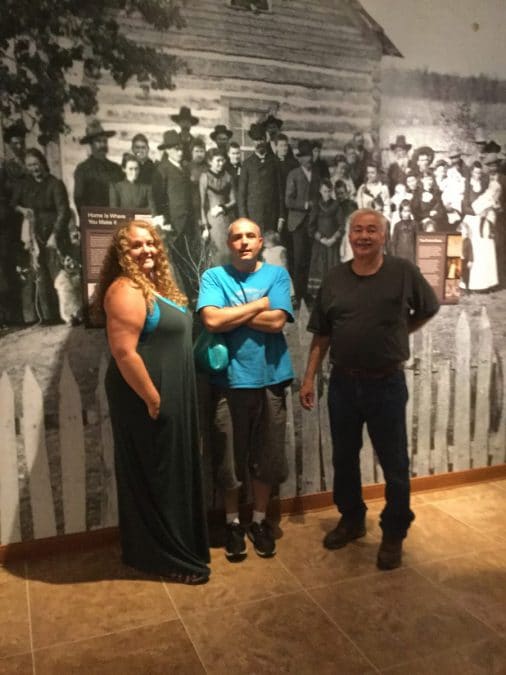As the coronavirus pandemic took hold of the United States, Citizen Potawatomi Nation member Rebecca Gardom moved to Denver, Colorado, to take a dream job with the Veterans Affairs Eastern Colorado Health Care System. She intended to work as a blind rehabilitation specialist at its clinic for the visually impaired; however, she was relocated to the Rocky Mountain Regional VA Medical Center in Aurora to track personal protective equipment for several months before beginning her original assignment.
“That was really crucial to make sure that anybody and everybody who works for the hospital has had a fit test and that they have the respirators that they need to keep them safe. It was a big blessing,” Gardom said.
Her impressive resume includes more than 12 years of experience as well as multiple degrees and certifications. She has taught patients how to adapt to blindness and visual impairments in South Carolina, Miami and now Colorado. The Tescier family descendant received Tribal scholarships and other financial assistance, helping her become a sought-after employee in a niche field.

Love of veterans
After Gardom lived on the East Coast for more than a decade, she began looking for jobs closer to her family in Arizona and New Mexico. The position with the VA in Colorado filled all of her wishes; her relatives lived within driving distance, and it utilized her skill set.
“I was hired on at the VA to instruct veterans with visual impairments and blindness how to travel safely in their environments,” Gardom said. “Orientation mobility skills are often taught with a long white cane, which are commonly known as blind skills and blind travel skills.”
She had wanted to work for the VA for a long time as well.
“This is my way of giving back to veterans who serve us in my own small way,” she said.
Many members of the Potawatomi side of her family are veterans. CPN’s Cultural Heritage Center honors those who served in the military by displaying their pictures on the Potawatomi Veterans Wall of Honor.
“My grandfather, James Gardom, then all of his brothers, Wayne Gardom, Paul Gardom, Charles Gardom — and all of them have been our veterans. And right now, there’s just one brother, Paul, living. My grandfather passed. But they are all represented there,” Gardom said.
She and her brother stop and see the wall whenever they travel through Oklahoma.
Essential respirators
At the Rocky Mountain Regional VA Medical Center, she kept track of personal protective equipment as part of the Occupational Safety and Health Team, specifically the Controlled Air Purifying Respirator systems. The battery-operated air filtration devices added to PPE offer another safety precaution against the coronavirus.
“There are so many people who use the CAPRs, like the COVID mobile testing sites and the drive-thru testing sites, and in pathology; the lab, they’re using them, and ICU and inpatient wards,” as well as HVAC repairmen, cleaning crews, nurses and more, Gardom said.
When she arrived to work each morning, Gardom located every CAPR to check their functionality. With more than 5,000 employees at the hospital, it amounted to a full time job. Gardom also logged every CAPR in a database, ensured engineers made the appropriate repairs and charged the batteries. Her shifts lasted between 12 and 17 hours, and her workday began at 3 a.m. The database is such an asset that the hospital added additional staff to assist Gardom on the Safety team for COVID operations.
Feeling called
“I absolutely was helping out, and I didn’t realize how much of a help it was until other staff were like, ‘Well, thank goodness you’re here because we can’t find a CAPR,’ or ‘This one, we dropped it today,’” Gardom said.
She also realized her positive attitude made as much of an impact for the exhausted staff. She prayed for everyone as she walked through the hospital, making her rounds.
“There is a spiritual awakening for me, as I drew closer to Mamogosnan, our God, to say, maybe being the smiling face for somebody who is getting off a 12-hour shift and totally exhausted and letting them know, ‘Hey, I’m here to help you out,’” Gardom said.
“I’m just filled with joy and love and peace and kindness, and I really spread that to the best of my ability.”
The staff’s hard work inspired her, too. In late June, the Occupational Safety and Health Team presented her with a department award — a 14-karat gold coin.
“It’s very special. On one side, it has a picture of the Rocky Mountain Regional Hospital, and on the other side, it says, ‘Safety through education and awareness.’ And I was blown away by this award, and I’m so grateful,” Gardom said.
She feels called to service no matter the job, as long as it helps others. She briefly met her co-workers at the blind and low vision clinic before moving to her new assignment at the main hospital. In mid-July, Gardom’s boss asked the hospital to allow her to return to her normal duties. She is very excited about serving veterans in her niche capacity and already planning for her next certification; however, both experiences met her expectations about working for the organization.
“The VA found a productive job for me to do to ensure that all veterans are safe, all employees are safe, at all times,” Gardom said. “And so it’s truly been an honor to serve in that light.”
